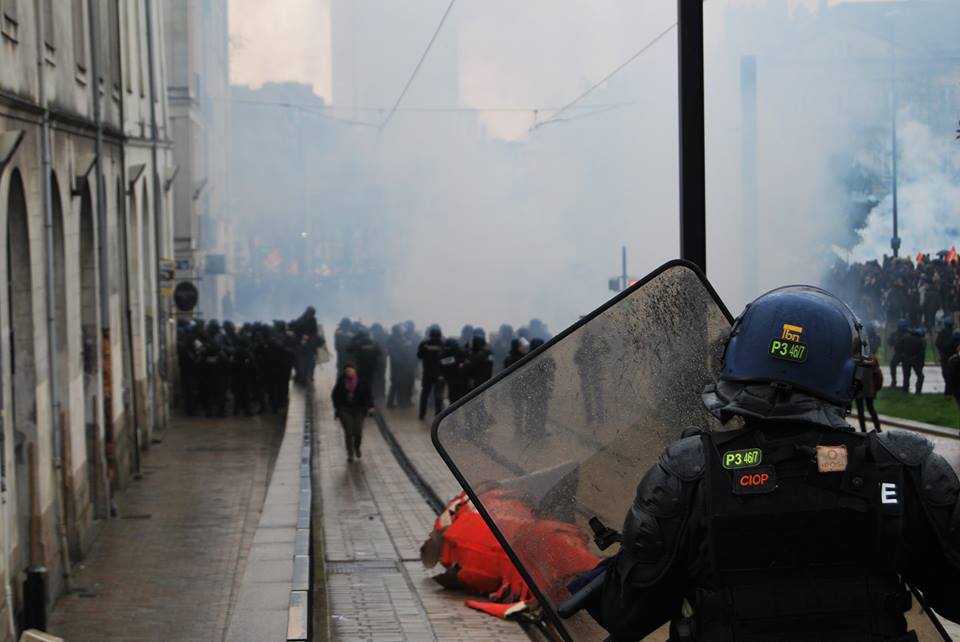WTF Is Going On in France?
by Julie Saumagne
13 April 2018

Since the election of Emmanuel Macron last year, student and worker mobilisation in France has been difficult. The two-third majority of his centrist party En Marche at the National Assembly and the repeated use of ordonnance have significantly sped up legislative processes. This has reduced the amount of time available to students and workers for building opposition to unpopular reforms. Even an ‘anti-terrorism’ law which was condemned by both Amnesty International and the Human Rights League was passed within six months.
In this context, current unrest in France is notable. In the space of a few weeks, widespread despondency has evolved into multiple and simultaneous fronts of resistance. Here are three things you need to know about what’s going on in France.
1. Student protest is heating up.
Inspired by trends in the UK and the US, Macron and his government are attempting to further marketize French higher education. Until now, on principle, anyone who applies to study at university in France gets a place. The Vidal/ORE law, adopted on 15 February, changes this: since there isn’t enough capacity to welcome everyone, and approximately 50% of first years drop out, the selection process is being reformed. The rationale of this reform ignores the fact that education methods, largely unchanged since the 1970s, are widely criticized for being rigid, uncritical and maladapted, and postulates that the way forward is to increase the ‘value’ of degrees by allowing less people to get them rather than investing in education and sorting out these problems. This is likely to increase social segregation and create competition between universities. The reforms also propose the introduction of ‘fast-track’ degrees, which would potentially lead to fee increases. Other risks include changes to conditions of eligibility for grants and the gradual disappearance of less ‘profitable’ courses, especially arts degrees.
Mobilization against these reforms initially struggled to build momentum. But on 22 March an occupation at the Montpellier law school was attacked by a group of masked men armed with planks of wood and tasers, who dispersed it violently. Strong evidence suggesting the dean of the school himself facilitated this attack caught media attention and turned it into a catalyst for resistance: campuses’ general assemblies suddenly started gathering hundreds of students. 35 out of 70 universities in France are now involved, with many either occupied, blocked or shut down entirely. Repression by the police and the CRS (paramilitary riot police), routinely present on several campuses as exams begin, stir an increasing anger, with staff siding more and more visibly with students.
2. Workers are striking across multiple sectors.
Macron’s attacks on public services do not stop here. Similarly inspired by the privatization of railways in Britain, a new ordonnance is preparing to open up the national train company SNCF to competition, to attack the terms and conditions of railway workers and to threaten 9000km of less profitable railway lines. With the railway unions being among the most powerful and organised unions in France, a three-month long rotating strike disrupting 90% of train services has begun.
Other strikes are happening simultaneously. In retail, 50% of Carrefour workers went on strike over Easter in opposition to the loss of 5000 jobs (while the dividends of company stakeholders will reach €356m this year). In air transport, there have been seven days of strikes since February, with around 25% of Air France workers demanding a 6% pay rise. In the social sector, a general feeling of exhaustion from classroom assistants to healthcare practitioners has led unions to address Macron in open letters and to organise several demonstrations and short strikes. In the justice sector, thousands of lawyers have mobilised and marched in Paris in opposition to the prioritisation of efficiency over fairness and the digitalisation of justice proposed by the government. While the links between these struggles are still weak, they are becoming increasingly visible.
3. The ZAD has come under attack.
The ZAD (Zone to Defend) of Notre-Dame-Des-Landes (NDDL), the largest occupation in Europe, started in 2008 when after half a century of conflict with activists the state resolved to build a second airport in Nantes. The scale of the social experiment the ZAD proposes is remarkable: occupiers have transformed this outstanding natural area into a space of radical education and organising, with its own bakery, brewery, a pirate radio station, an online newspaper, and a weekly affordable vegetable market.
In January, Macron scrapped the airport plan. This was a massive victory, but on 9 April evictions began at the ZAD with the arrival of 2500 heavily-armed paramilitary gendarmes, 70 police buses and armoured vehicles, and later helicopters. Following the chaos of the 2012 attempted eviction, the government didn’t allow the French media to film this intense military operation, and instead provided them with police footage. A few reporters risked attending the evictions nonetheless, and social media was flooded with images of tear gas, explosive and deafening grenades thrown at occupiers and journalists alike. On 12 April it was announced the evictions had been stopped. Most of the site is destroyed and 80 activists are undergoing medical treatment, but for now the ZAD has been defended, and despite arrests the following morning the police has backed down. The future of the ZAD is yet to be determined, but massive international support is expected to converge in NDDL on 15 April.
–
Only 23% of France’s population voluntarily elected Macron, but this ‘democratic’ mandate is allowing him to push through a neoliberal agenda at an unprecedented rate. His government is repressing opposition with utmost brutality, and the evil he was meant to have stood against – fascism – is taking grip. Things are moving quickly, and it’s hard to say in what direction. May ‘68 is present in everyone’s minds, and in the past few days convergeance des luttes have become watchwords. The French have seen what Macron is up to, and what it is that can stop him.